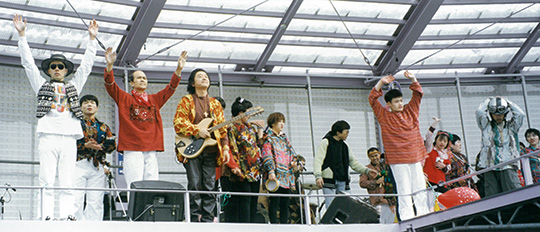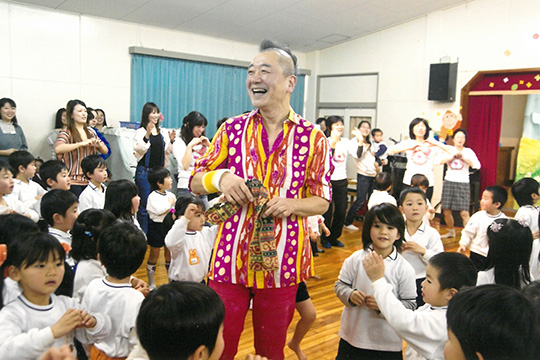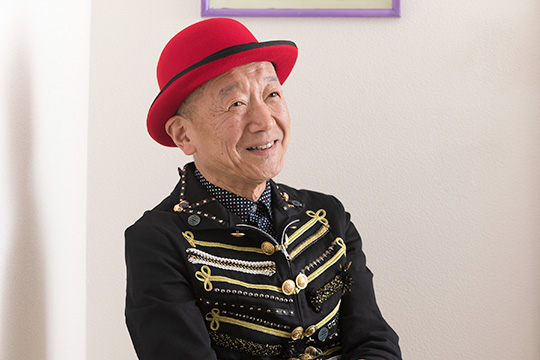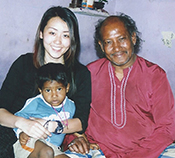Rock the World to Make It Better.
(Part 1)
Tetsu Kashiwa / Singer and Songwriter
Rock Music has Always Been About Breaking Through Social Injustice.
The music of SalsaGumtape, the ultimate in barrier-free bands, is known for its power to energize and uplift. Tetsu Kashiwa has been leading the group for 25 years. He tells us about his passion for rock music and his mission to change people’s perceptions in Japan through the music of SalsaGumtape.
A band of musicians with a pure love of music—people with cognitive challenges.
“Twist & Shout” by The Beatles and “Satisfaction” by The Rolling Stones blew my teenage mind. Mesmerized, I picked up a guitar and became a musician at once. The first big break in my musical career came more than decade later, when I turned 31. Producers at NHK, Japan’s public broadcasting corporation, selected me to become the “Uta no Onii-san” in a children's program called “With Mother.” The genre wasn’t my first choice, but I made the best of it and stuck to my policy of writing and singing my own songs. By writing songs for children, I learned the art of conveying ideas with a few simple words.
After leaving “With Mother,” I was often invited to give small concerts at social welfare centers. The people with cognitive challenges in the audience were incredible to play for. When we played with energy, they would jump from their seats and clap their hands with a strong sense of rhythm. The energizing force for them wasn’t the reputation or name value of the band, but the music itself. The children I had played for as a “Uta no Onii-san,” I recognized, were similarly honest and unprejudiced in their responses. When our performances flagged, they simply got bored and fell asleep. The kids in the studio and cognitively challenged audiences in the welfare centers responded directly to what we played for them. I was hugely attracted to the purity of their reactions. So I formed SalsaGumtape to play music with residents of a welfare center in Hadano, Kanagawa in 1994.

Rhythm is a fundamental form of human expression.
I turned up at the welfare center and declared the inauguration of SalsaGumtape. Clueless about the process of forming a band in this extraordinary situation, I made it up as I went along. Our sound, I knew, had to be composed of 90 percent percussion. Rhythm is elemental; it lives inside our bodies. A person can play a drum more immediately, more powerfully than a pitched instrument, which requires training and precision to find the “correct” notes. We began with about 25 people in the group, each equipped with a percussion instrument of one type or another. We tried a free-style rhythmic ensemble, with me feeding in a melody on guitar at the core. We kept the music as loose as possible at first, each of us playing at our own pace. Only after several sessions did we reach moments when the disjointed rhythms of different instruments merged into one. Slowly over time, a smooth groove all of our own started to evolve.
On reflection, I actually started along my journey to create SalsaGumtape in Paraguay. South American music is mainly rhythm-driven, like samba. People gather into large ensembles spontaneously, bringing together percussion instruments of all types. They immerse in their rhythms for hours on end, losing themselves in the joy of the music, never minding if sometimes they drift off the beat. If I hadn’t been inspired by their joyous, free-hearted approach, I would have been irked every time a band member in SalsaGumtape made the “wrong” sound. Our band would have been a disaster!

I want to do something to change the adverse circumstances facing our band members.
I wrote “Fried Chicken” not long after we started the band, just when our groove was starting to come together. The idea was sparked by one of the band members who loved fried chicken. Much of the band’s repertoire is inspired by things that our members say, and by my own indignation about the situations in which they are placed. SalsaGumtape has given me the opportunity to better know and understand the cognitively challenged as people. Year by year, my impatience with their treatment and my determination to improve their circumstances grow.
A sad thing, always, after a day of playing together, is the rift that forms between us when we finish. Our members with normal abilities go one way; our members with disabilities go another. From the early days, the problems at the welfare centers were easy to see. What sense was there, I asked myself, of treating the cognitively challenged as less than normal? A sense of indignation fueled my rock’n’roll spirit. Rock music has a liberating power that nourishes us as a band. Without that power, we would have broken up long ago. Both my sense of indignation and the joy of playing music with a group of super fun people are the driving force for me.

- Tetsu Kashiwa / Singer and Songwriter
- In the early 1980s, Kashiwa performed as the fifth “Uta no Onii-san (singer for children)” on “With Mother,” a children's TV show on Japan’s public broadcasting network, NHK. He also composed popular sing-along songs, such as “Suzume ga Samaba(Sparrow Samba)” and “Kimi no Namae(Your Name),” over the same period. In 1994 he formed SalsaGumtape, inviting people with cognitive challenges to join as members. SalsaGumtape has performed at the Fuji Rock Festival and collaborated with the legendary rock musician Kiyoshiro Imawano.
Interview Date:



